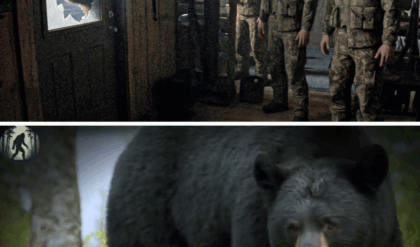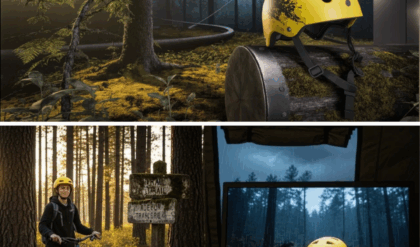La Ferrari roja había llegado al taller una mañana gris, cubierta de un silencio extraño que contrastaba con la potencia que debía llevar en su interior. El dueño del auto, un hombre de mediana edad con expresión cansada, explicó que el motor simplemente dejó de responder sin previo aviso. Lo había llevado a otros talleres, todos con reconocidos expertos, pero nadie había logrado hacer que el motor volviera a rugir. Su mirada reflejaba una mezcla de frustración y resignación, como si ya hubiera empezado a aceptar que aquel automóvil, símbolo de su mayor logro económico, se había convertido en un monumento inmóvil a la mala suerte.
Los mecánicos del taller se reunieron de inmediato alrededor del vehículo. Lo consideraban un desafío digno de su reputación. Revisaron el motor con meticulosidad, desmontaron piezas, limpiaron componentes, conectaron computadoras de diagnóstico y analizaron una y otra vez los mismos datos que no parecían tener sentido. Cada intento fallido incrementaba la tensión en el ambiente. El sonido metálico de las herramientas golpeaba contra el piso, acompañado de murmullos frustrados y suspiros pesados. Pasaron las horas y luego pasaron los días, y la Ferrari seguía inmóvil, como si se burlara de todos con su silencio arrogante.
El dueño regresaba cada tarde, esperando buenas noticias, pero solo encontraba caras largas y explicaciones evasivas. Los mecánicos no querían admitirlo abiertamente, pero había algo en ese motor que parecía desafiar toda lógica. No era un problema común, no era una falla evidente. Era como si la Ferrari hubiera perdido el deseo de despertar. La impotencia comenzó a hacerse presente incluso entre los más experimentados, aquellos que habían reparado motores aún más complejos. Diez mecánicos habían intentado devolverle la vida, cada uno aplicando sus conocimientos, su experiencia, su ingenio. Diez mecánicos habían fracasado.
Una mañana, cuando el ambiente del taller era más pesado que nunca, apareció una joven de cabello oscuro recogido en un moño práctico y manos que mostraban años de trabajo a pesar de su juventud. Había sido contratada recientemente para reemplazar a un empleado que se jubilaba. Su presencia no llamó demasiado la atención al principio; era solo una nueva mecánica en un equipo dominado por hombres veteranos y acostumbrados a resolver problemas aparentemente imposibles. Nadie imaginó que su llegada traería un cambio que todos recordarían durante mucho tiempo.
La joven observó la Ferrari desde la distancia al principio. No dijo nada, no preguntó nada. Solo escuchó los comentarios frustrados y analizó los gestos tensos de sus compañeros. Podía identificar el cansancio en sus ojos, la derrota oculta detrás de las bromas sarcásticas que hacían para disimular su incapacidad. Había algo en esa escena que despertó en ella una curiosidad intensa. Finalmente, cuando uno de los mecánicos lanzó una herramienta sobre la mesa con un suspiro exasperado, ella decidió acercarse al auto.
Los demás la miraron con sorpresa. Algunos arqueaban las cejas, otros intercambiaban miradas como si estuvieran presenciando un acto atrevido. Nadie esperaba que ella se ofreciera a revisar la Ferrari. Ni siquiera había participado en los intentos previos, pero ahora se inclinaba sobre el motor con una atención casi reverencial. No necesitaba hablar; sus manos parecían comunicarse con la máquina a través de cada toque ligero, cada movimiento cuidadoso. Escuchó el silencio del motor como quien intenta discriminar un susurro entre un mar de ruido.
Uno de los mecánicos, intentando contener la risa, le preguntó si creía que podría hacer lo que diez profesionales no habían logrado. Ella no respondió. Sus ojos seguían fijos en el motor como si el mundo a su alrededor hubiera desaparecido. Dejó que sus dedos recorrieran cables, conectores, tornillos, buscando algo que no era visible a simple vista. Para ella, cada detalle contaba; cada vibración mínima, cada pequeño olor metálico, cada imperfección era una pista que la llevaba más cerca de la verdad.
El dueño del auto, que había llegado justo en ese momento, se quedó observando la escena con desconcierto. No sabía si debía sentirse esperanzado o simplemente aceptar que la situación se había vuelto tan desesperada que incluso una nueva empleada estaba intentando resolver lo que parecía imposible. Sin embargo, algo en la manera de trabajar de la joven lo hizo detenerse a observar con atención. Era diferente de los demás. No parecía luchar contra el motor, sino escucharlo. No parecía imponerse, sino dialogar con él.
Después de varios minutos de silencio absoluto, la joven suspiró suavemente, como si hubiera encontrado al fin lo que buscaba. No hizo ningún comentario dramático ni gestos exagerados. Simplemente pidió un destornillador pequeño y una lámpara portátil. Sus movimientos eran tan precisos que los demás mecánicos se quedaron quietos, observando sin entender. Ella retiró una cubierta, limpió un punto específico del sistema eléctrico y ajustó un conector diminuto que cualquiera habría considerado insignificante. Era un detalle tan pequeño que muchos ni siquiera lo habrían visto, pero ella lo había detectado casi de inmediato. Su intuición mecánica era como un sexto sentido.
Cuando terminó, se enderezó, respiró profundamente y se dirigió hacia el asiento del conductor. El taller entero contuvo el aliento. Tenían la sensación de estar presenciando algo que podía cambiarlo todo. La joven insertó la llave en el encendido, giró con suavidad y cerró los ojos por un instante, como si estuviera esperando que la Ferrari decidiera por sí misma si quería despertar.
Entonces ocurrió.
El motor rugió.
No tímidamente, no con dudas. Rugió con fuerza, con vida, con un sonido profundo que llenó el taller de energía. Era como si el auto hubiera esperado exactamente ese toque, esa precisión, esa sensibilidad para recordar quién era.
La joven sonrió apenas. Los demás quedaron en silencio, boquiabiertos, incapaces de creer lo que acababan de presenciar.
Ella había logrado lo que diez mecánicos no pudieron. Y lo hizo en minutos.
As Family Week unfolded in the Bigg Boss 19 house, the atmosphere became a charged blend of excitement, nostalgia, and strategic calculation. Kunickaa’s son and Ashnoor’s father, though entering simply to connect with their loved ones, immediately altered the dynamics of the house. Contestants were caught between empathy for the emotional reunions and the ever-present awareness that these moments could influence gameplay.
Kunickaa and her son shared a series of intimate moments, laughter mingled with tears, capturing the essence of maternal bond under extraordinary circumstances. Their interactions were tender, yet Kunickaa had to maintain an awareness of cameras and other contestants, balancing the personal with the performative. Housemates watched, some smiling warmly at the sweetness, others observing with analytical minds, considering how these emotional flashes might alter alliances, decisions, or behavior in tasks.
Ashnoor’s reunion with her father carried a different energy. Her joy was palpable, a mixture of relief, love, and a sudden sense of grounding amid the high-pressure environment of Bigg Boss. Her father’s presence evoked protective instincts, heartfelt conversations, and emotional vulnerability that had rarely been on display in the competitive house. While Ashnoor embraced the warmth of her family, contestants around them processed the emotional influx, some moved, others recalibrating strategies, aware that personal feelings could now influence nominations, confrontations, and alliances.
The interactions quickly extended beyond immediate reunions. Conversations naturally flowed to shared family stories, teasing moments, and playful banter. These lighter moments created rare pockets of levity in an environment typically dominated by calculation and tension. Yet, underneath the smiles, strategic awareness persisted. Contestants recognized that emotions revealed during Family Week could strengthen or weaken social influence, making even casual interactions subject to scrutiny and planning.
Tensions began to surface when the natural emotional bonds intersected with competitive instincts. For example, a minor disagreement between housemates during a task escalated subtly because family presence heightened emotions. Kunickaa’s son observed with innocent curiosity, unaware of the strategic undertones, while contestants tried to manage reactions so as not to appear overly aggressive in front of family members. Similarly, Ashnoor’s father’s comforting words occasionally gave her confidence that subtly shifted power dynamics, prompting whispers and side glances among other contestants as they reassessed alliances and possible threats.
The cameras captured every nuanced reaction: a flinch, a smile, a glance exchanged across the room. Housemates’ behavior changed in subtle ways. Some softened, demonstrating empathy or restraint, while others strategically used the presence of family to gain advantage or protect themselves. Tanya Mittal, for instance, navigated the new environment carefully, showing kindness while simultaneously observing how alliances were shifting. Pranit and Farhana noted that family interventions had temporarily reshaped social influence, prompting tactical adjustments in their approaches.
For the contestants directly involved, the emotional moments were intense. Kunickaa expressed deep relief and joy at being reunited with her son, a humanizing contrast to the strategic persona she had maintained. Ashnoor’s father offered advice, encouragement, and emotional support, grounding her in a way that subtly strengthened her gameplay. These interactions reinforced personal bonds while also introducing strategic ripple effects across the house. Emotional authenticity now intertwined with tactical awareness, creating a delicate balance between heart and game.
Social media reactions mirrored the intensity within the house. Fans were enthralled by the heartfelt reunions, posting clips of the most touching moments, debating how family entries would influence the game, and expressing admiration for the contestants’ emotional composure. The promo had delivered not just excitement but a promise of drama, strategy, and unpredictability, leaving viewers eagerly anticipating the ripple effects in upcoming episodes.
By the middle of Family Week, it was evident that the house had been subtly transformed. Alliances were reevaluated, conversations became more mindful, and contestants approached each interaction with a heightened awareness of emotional perception. The presence of Kunickaa’s son and Ashnoor’s father had not only enriched the narrative with warmth and authenticity but had also introduced a strategic complexity that contestants had to navigate carefully.
The day concluded with shared meals, laughter, and reflective conversations. Family members, though temporarily visitors in the competitive space, left an imprint on the housemates’ perceptions and decisions. Kunickaa and Ashnoor returned to their routines with a renewed emotional foundation, while other contestants absorbed lessons about influence, empathy, and strategy. The interplay of family, emotion, and competition made Family Week a defining moment, demonstrating that in Bigg Boss, the personal and the strategic are inextricably intertwined.
As Family Week progressed, the influence of Kunickaa’s son and Ashnoor’s father extended far beyond their initial arrivals. What began as emotional reunions had transformed the house into a space where personal bonds intersected with strategic gameplay, forcing contestants to navigate emotions alongside calculations. The dynamics shifted subtly but significantly, affecting alliances, conversations, and even the approaches contestants took toward tasks and nominations.
For Kunickaa, the week became an opportunity to blend personal authenticity with gameplay. Her interactions with her son had reinforced her emotional resilience while also humanizing her in the eyes of fellow contestants. She leveraged the subtle respect and empathy gained from these moments to strengthen alliances, solidify trust among allies, and manage perceptions among potential rivals. The duality of presenting genuine emotion while maintaining strategic awareness became her defining tactic for the week.
Ashnoor, similarly, experienced a strategic advantage through her father’s presence. Emotional support bolstered her confidence, allowing her to navigate challenges with renewed composure. The interactions gave her insight into how personal relationships could shift power dynamics in the house. Fellow contestants recognized the shift, observing that Ashnoor seemed more grounded, more assertive, and subtly more influential in group decisions. Her father’s presence, though brief, created ripples that redefined social hierarchies and altered perceptions of her resilience.
The other contestants were equally affected. Witnessing emotional reunions prompted reassessment of strategies, alliances, and behavior. Some contestants softened, demonstrating empathy and restraint that would influence future negotiations and interactions. Others recalibrated tactics, recognizing that vulnerability and authenticity could not be ignored in a game defined by observation, social perception, and manipulation. The presence of family members had created a unique blend of emotional authenticity and competitive tension, highlighting the complexity of Bigg Boss as both a social experiment and a game of strategy.
Small interactions carried new weight. Conversations that would normally be casual now required awareness of the emotional undertone created by Family Week. Contestants carefully measured words, gestures, and reactions, knowing that family presence could reveal hidden intentions, strengthen alliances, or expose vulnerabilities. The strategic landscape had subtly shifted: influence was no longer determined solely by gameplay or charisma, but also by the ability to navigate emotional intelligence alongside competition.
Tasks during Family Week took on new significance. The housemates’ performances were influenced by emotional states and the subtle power shifts brought about by family interactions. For example, when team challenges occurred, contestants who had experienced positive emotional reinforcement from family members demonstrated increased confidence, focus, and collaboration. Conversely, those unsettled by the emotional undercurrents had to adapt quickly to maintain composure, highlighting the delicate balance between personal feelings and game strategy.
The social dynamics were equally complex. Alliances formed or strengthened through shared empathy, while rivalries were occasionally tempered by the presence of family. Contestants who had been highly competitive or aggressive displayed moments of restraint, mindful of how they were perceived in light of Family Week. Tanya Mittal, Pranit, and Farhana observed these subtle changes, recalibrating their own strategies to account for the nuanced interplay of emotion and power. Emotional intelligence became an unspoken currency, influencing decision-making, nominations, and task performance.
For viewers, Family Week provided both entertainment and insight into human behavior. Social media erupted with discussions about the contestants’ reactions, emotional expressions, and strategic adjustments. Fans debated how the presence of Kunickaa’s son and Ashnoor’s father would affect future episodes, alliances, and eventual outcomes. The week highlighted that in Bigg Boss, personal narratives and emotional authenticity are as crucial as competitive tactics, creating content that resonates on multiple levels with the audience.
By the end of Family Week, it was evident that the house had undergone a transformation. Emotional bonds, combined with strategic recalibration, created a richer, more layered social environment. Kunickaa and Ashnoor had gained renewed confidence and influence, while other contestants had adjusted perceptions and strategies based on observed vulnerabilities and strengths. The presence of family members had subtly but significantly shifted the power dynamics, demonstrating that empathy, emotion, and personal connections could coexist with strategic calculation in a high-stakes environment.
The week concluded with reflective moments for contestants and viewers alike. Emotional connections, heartfelt conversations, and even lighthearted interactions had left a lasting impact, shaping not just immediate alliances but the overarching narrative of the season. Family Week had reaffirmed the dual nature of Bigg Boss: a competition of strategy and wit intertwined with an intimate exploration of human emotion.
Ultimately, Family Week became a defining chapter in Bigg Boss 19. Kunickaa’s son and Ashnoor’s father had entered the house as catalysts, leaving a lasting imprint on relationships, strategy, and social hierarchy. Contestants emerged with greater awareness, stronger emotional bonds, and recalibrated tactics, while viewers were treated to a blend of heartfelt drama, strategic maneuvering, and the profound complexity of human connection under extraordinary circumstances. Family Week had proved that in Bigg Boss, victory is not only about power and manipulation but also about empathy, emotional intelligence, and the ability to balance heart with strategy.





